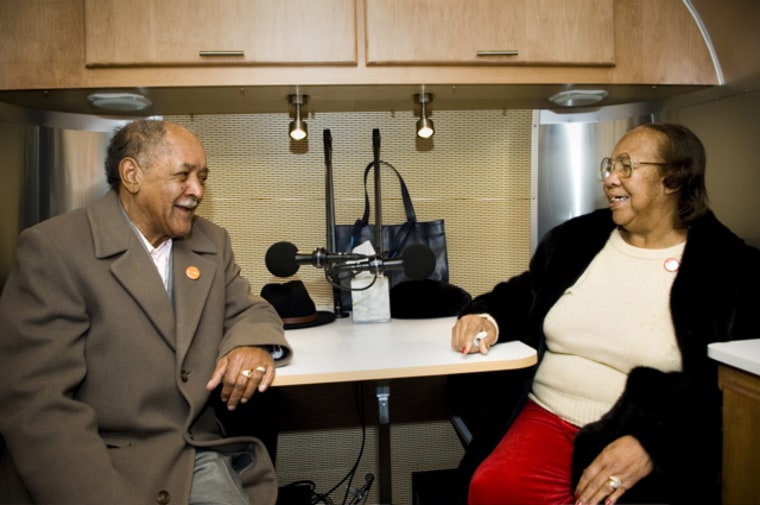If you are a regular listener of National Public Radio, then you are probably familiar with the StoryCorps project. For years now, microphones have been set up in public and mobile studios to record the stories of average Americans.
There is no formality — the guests, usually two people, are just told when the recording starts and that they have 40 minutes to talk about anything they want. For most people the narratives are about special moments in their lives or perhaps a brush with history.
The latest project in this series is called the Griot Initiative. A Griot is the West African name given to someone who is a community poet or storyteller. For StoryCorps, the Griot initiative is recording African-American voices and experiences, eventually to become an oral history of black life in the 20th century.
Both StoryCorps and NPR agreed to premiere Project Griot a bit earlier than originally planned. It will air beginning on Friday's "Morning Edition" program in light of recent events which have prompted Americans to focus on race.
They feel the Griot Project offers historic, personal and uplifting insights into the hearts and minds of African Americans and the civil rights movement in this country.
To me the most compelling of the StoryCorps interviews are those conducted by a family member. They feel and sound so intimate that I almost feel as though I’m eavesdropping on a private moment. These conversations strike a chord often in my own life, and I’m not alone judging by the popularity of the pieces.
Those in the recording booths aren’t alone either. There is a “facilitator” with them, a person who helps answer any questions before the session begins, sets the mics, handles the headphones, and presents them with a CD of their recording when it’s over.
I recently spoke to Nadja Middleton, a facilitator for the new Griot Initiative. She described the recording booth as “sacred space” that even people who have known and spoken to one another every day of their lives step into and for the first time have a real conversation. They ask questions never asked before. Ironically, in an era when communication has never been so easy, we seldom seem to really talk with each other. Except inside this sacred space. Middleton says she is often deeply moved by what she hears.
As part of our reporting, I overheard a recording session of three sisters. Gloria Johnson, Madeliene Smith and Bennie Rivers grew up in the Auburn neighborhood of Atlanta, which was also home to Dr. Martin Luther King Jr. They attended Ebenezer Baptist Church, his church.
All of us know of King. They knew King. They can describe what it was like to be in his presence, insight no history book can really give, especially when you hear it delivered by the voices of those who were there. That’s one of the reasons all of the conversations will be stored with the Library of Congress for future generations.
As I mentioned, once in the booth people talk of things they never would mention out of it — as was the case of the sisters and Dr. King’s tuxedo.
Gloria began the story by saying “back in the day” she was invited to a formal function, but her date did not have a tuxedo, without which they couldn’t get in. Hardly anyone in her neighborhood at that time owned a tuxedo, with the exception of one man, Dr King.
“And I said, 'I know who had a tuxedo,'” Gloria said. And as fate would have it, King was out of town and another of Gloria’s sisters, Hazel, was working in the King home.
“So I called Hazel, I said, 'Hazel, me and Marvin is on the way over there.' I said, 'we got to get a tuxedo tonight.' She said, ‘where am I gonna get it from?’ I said, 'Dr. Martin Luther King Jr. has one.' She said, ‘I can not let you borrow his clothes!’”
Moments later, Gloria and her date were at the door of the King home.
“And Hazel let us in and she was just a fussin’," recalled Gloria. "‘I don’t know why you doin’ this? You know I can’t do this.’ I said, 'I got to get this tuxedo for Marvin to take me to this affair.' And so she said, ‘Well, get in here in the bathroom and change clothes. I’ll let you wear it, but you better bring it back!’”
So that’s how a tux fit for a King went to the party without him.
“And to this day Martin Luther King Jr. never did know that we borrowed his tuxedo," said Gloria.

Thanks to the Griot Initiative, those three sisters will be able to tell that story again and again for generations to come. As will Taylor and Bessie Rogers.
"As a 12-year-old, I was just magnetized by his charisma," says Taylor Rogers of King. Rogers and his wife Bessie didn't know King, but they were in the room that night in Memphis for his last speech.
"You could tell by the expression on his face, he knew something was going to happen," Bessie says.
The Griot project will travel the country for a full year gathering the stories of thousands of African American families from all walks of life. But it's not the first time something like this has been done.
In the 1930s, a government program conducted 2,300 interviews of former slaves — now considered one of the most important collections of its kind.
"If I thought I'd ever be a slave again, I'd take a gun and end it," one of the voices on the tapes proclaims.
Like those, these latest stories will be archived in the Library of Congress for future study, in essence making this silver trailer a time machine that allows the voices of today to speak to the children of tomorrow.